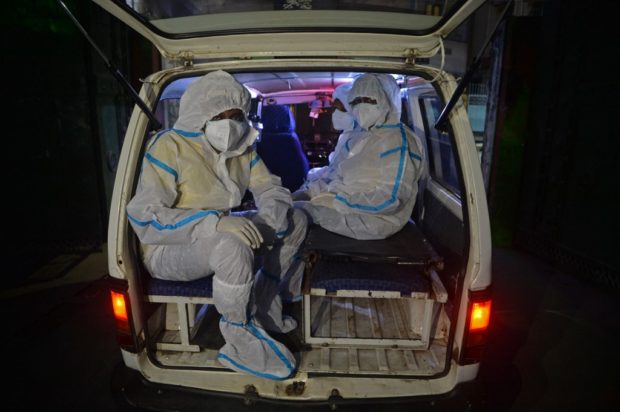US advises against India travel as coronavirus cases surge

Patients infected with COVID-19 sit inside an ambulance outside a polling station after casting their vote during the fifth phase of the West Bengal’s state legislative assembly elections in Siliguri on April 17, 2021. (Photo by Diptendu DUTTA / AFP)
New Delhi, India — The United States has warned against travel to India, where authorities on Tuesday imposed tighter restrictions to combat an explosion of COVID-19 cases.
India has recorded more than three million new infections and 18,000 deaths this month, bringing its caseload to the world’s second-highest, after the United States.
The updated US travel advisory comes after the State Department announced Monday it would apply “do not travel” guidance to about 80 percent of countries worldwide, citing the unprecedented risk posed by the pandemic.
“Even fully vaccinated travelers… should avoid all travel to India,” the US Centers for Disease Control and Prevention said.
Singapore also boosted restrictions on arrivals from India Tuesday, adding a week to the previously required 14-day quarantine period.
These moves follow Britain’s decision on Monday to add India to its “red list”, and Hong Kong’s ban on all flights from the country.
‘Tipping point’
India has been struggling to rein in its raging outbreak, with hospitals running out of beds and the government forced to reimpose economically painful restrictions.
Its capital and worst-hit city New Delhi entered a week-long lockdown on Monday, with parks, cinemas and malls closed.
“Delhi’s health system is at a tipping point,” said chief minister Arvind Kejriwal, who on Tuesday went into self-isolation after his wife tested positive.
The lockdown announcement prompted tens of thousands of migrant workers to flee Delhi, in scenes reminiscent of the national shutdown a year ago that inflicted economic and human misery.
Mumbai’s home state of Maharashtra, the epicenter of the recent surge, on Tuesday further tightened restrictions on grocery shops and home deliveries.
All non-essential shops and malls in the western state are currently shut until May 1.
Uttar Pradesh, home to some 240 million people, on Tuesday announced a weekend lockdown from Friday evening, whilst Telangana state in the south became the latest to impose a night curfew.
Former Indian prime minister Manmohan Singh, 88, was admitted to hospital with the virus on Monday. Officials said Tuesday that his condition was stable.
Mass vaccinations
In a sign of how dangerously overstretched the hospitals are, people are using social media to appeal for medical supplies for their relatives.
On Monday night, a special “Oxygen Express” train left Mumbai to the industrial southern city of Visakhapatnam, carrying seven empty tanker trucks that should return full in four days.
Experts have warned that religious festivals and packed state election rallies in India have become “superspreader” events — and some have said mass vaccinations are the only long-term solution.
India kicked off its inoculation drive in mid-January and has administered more than 127 million shots so far to a population of 1.3 billion people.
From May 1, all adults will be able to get vaccinated, the government announced Monday.
“It’s about time! I think this should’ve been done much sooner,” Mumbai-based screenwriter Nisha Kalra, 28, told AFP.
“Knowing we can get vaccinated has immediately reduced the stress, panic, and horror of the last few weeks.”
Some local authorities have however been running short of supplies, and India has put the brakes on exports of the AstraZeneca shot.
Meanwhile, India’s Bharat Biotech said Tuesday that it is scaling up production of its homegrown Covaxin vaccine to 700 million doses per year.
Covaxin is being administered alongside the AstraZeneca vaccine in India, while approval has also been given for the Russian Sputnik V.
Bharat said that emergency approval for Covaxin has been given approval in several countries including Mexico, the Philippines, and Iran, and is pending in the United States and several European countries.
For more news about the novel coronavirus click here.
What you need to know about Coronavirus.
For more information on COVID-19, call the DOH Hotline: (02) 86517800 local 1149/1150.
The Inquirer Foundation supports our healthcare frontliners and is still accepting cash donations to be deposited at Banco de Oro (BDO) current account #007960018860 or donate through PayMaya using this link.